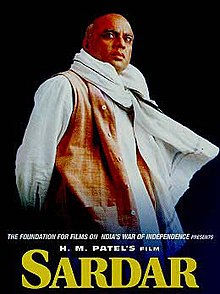
Jawaharlal Nehru was an Indian anti-colonial nationalist, statesman, secular humanist, social democrat, and author who was a central figure in India during the middle of the 20th century. Nehru was a principal leader of the Indian nationalist movement in the 1930s and 1940s. Upon India's independence in 1947, he served as the country's first prime minister for 16 years. Nehru promoted parliamentary democracy, secularism, and science and technology during the 1950s, powerfully influencing India's arc as a modern nation. In international affairs, he steered India clear of the two blocs of the Cold War. A well-regarded author, his books written in prison, such as Letters from a Father to His Daughter (1929), An Autobiography (1936) and The Discovery of India (1946), have been read around the world.
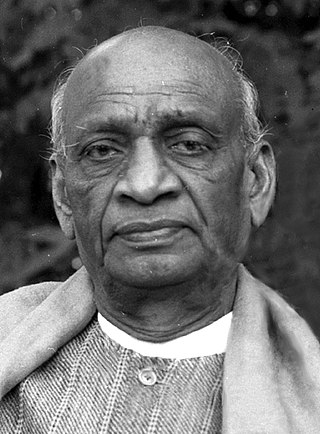
Vallabhbhai Jhaverbhai Patel, commonly known as Sardar Vallabhbhai Patel, was an Indian independence nationalist and barrister who served as the first Deputy Prime Minister and Home Minister of India from 1947 to 1950. He was a senior leader of the Indian National Congress, who played a significant role in the country's struggle for independence and its political integration. In India and elsewhere, he was often called Sardar, meaning "Chief" in Hindi, Urdu, Bengali and Persian. He acted as the Home Minister during the political integration of India and the Indo-Pakistani War of 1947.
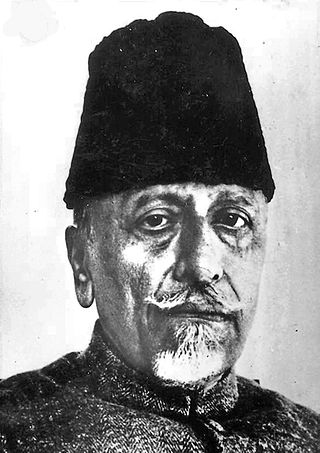
Abul Kalam Ghulam Muhiyuddin Ahmed bin Khairuddin Al-Hussaini Azad ; 11 November 1888 – 22 February 1958) was an Indian independence activist, writer and a senior leader of the Indian National Congress. Following India's independence, he became the First Minister of Education in the Indian government. He is commonly remembered as Maulana Azad; the word Maulana is an honorific meaning 'Our Master' and he had adopted Azad (Free) as his pen name. His contribution to establishing the education foundation in India is recognised by celebrating his birthday as National Education Day across India.

The Indian Independence Act 1947 is an act of the Parliament of the United Kingdom that partitioned British India into the two new independent dominions of India and Pakistan. The Act received Royal Assent on 18 July 1947 and thus modern-day India and Pakistan, comprising west and east regions, came into being on 15 August.
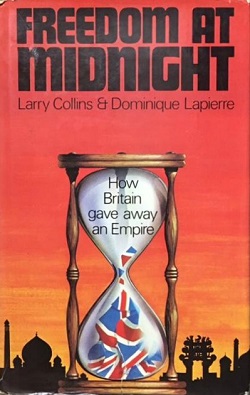
Freedom at Midnight (1975) is a non-fiction book by Larry Collins and Dominique Lapierre about the events around the Indian independence movement and partition. It details the last year of the British Raj, from 1947 to 1948, beginning with the appointment of Lord Mountbatten of Burma as the last viceroy of British India, and ending with the death and funeral of Mahatma Gandhi.
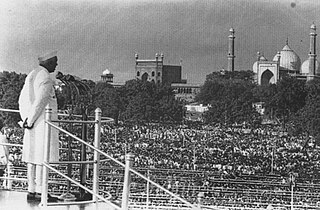
The history of independent India or history of Republic of India began when the country became an independent sovereign state within the British Commonwealth on 15 August 1947. Direct administration by the British, which began in 1858, affected a political and economic unification of the subcontinent. When British rule came to an end in 1947, the subcontinent was partitioned along religious lines into two separate countries—India, with a majority of Hindus, and Pakistan, with a majority of Muslims. Concurrently the Muslim-majority northwest and east of British India was separated into the Dominion of Pakistan, by the Partition of India. The partition led to a population transfer of more than 10 million people between India and Pakistan and the death of about one million people. Indian National Congress leader Jawaharlal Nehru became the first Prime Minister of India, but the leader most associated with the independence struggle, Mahatma Gandhi, accepted no office. The constitution adopted in 1950 made India a democratic republic with Westminster style parliamentary system of government, both at federal and state level respectively. The democracy has been sustained since then. India's sustained democratic freedoms are unique among the world's newly independent states.

Independence Day is celebrated annually on 15 August as a public holiday in India commemorating the nation's independence from the United Kingdom on 15 August 1947, the day when the provisions of the Indian Independence Act, which transferred legislative sovereignty to the Indian Constituent Assembly, came into effect. India retained King George VI as head of state until its transition to a republic, when the Constitution of India came into effect on 26 January 1950 and replaced the dominion prefix, Dominion of India, with the enactment of the sovereign law Constitution of India. India attained independence following the independence movement noted for largely non-violent resistance and civil disobedience led by Indian National Congress under the leadership of Mahatma Gandhi who adopted these values from one of the early movements in India led by Ram Singh Kuka.

Indian nationalism is an instance of territorial nationalism, which is inclusive of all of the people of India, despite their diverse ethnic, linguistic and religious backgrounds. Indian nationalism can trace roots to pre-colonial India, but was fully developed during the Indian independence movement which campaigned for independence from British rule. Indian nationalism quickly rose to popularity in India through these united anti-colonial coalitions and movements. Independence movement figures like Mahatma Gandhi and Jawaharlal Nehru spearheaded the Indian nationalist movement. After Indian Independence, Nehru and his successors continued to campaign on Indian nationalism in face of border wars with both China and Pakistan. After the Indo-Pakistan War of 1971 and the Bangladesh Liberation War, Indian nationalism reached its post-independence peak. However by the 1980s, religious tensions reached a melting point and Indian nationalism sluggishly collapsed in the following decades. Despite its decline and the rise of religious nationalism, Indian nationalism and its historic figures continue to strongly influence the politics of India and reflect an opposition to the sectarian strands of Hindu nationalism and Muslim nationalism.

Kanhaiyalal Maneklal Munshi, popularly known by his pen name Ghanshyam Vyas, was an Indian independence movement activist, politician, writer from Gujarat state. A lawyer by profession, he later turned to author and politician. He is a well-known name in Gujarati literature. He founded Bharatiya Vidya Bhavan, an educational trust, in 1938.

Jivatram Bhagwandas Kripalani, popularly known as Acharya Kripalani, was an Indian politician, noted particularly for holding the presidency of the Indian National Congress during the transfer of power in 1947 and the husband of Sucheta Kripalani. Kripalani was an environmentalist, mystic and independence activist who was long a Gandhian socialist, before joining the economically right wing Swatantra Party later in life.

Vappala Pangunni Menon was an Indian civil servant who served as Secretary to the Government of India in the Ministry of the States, under Sardar Patel. By appointment from Viceroy and Governor-General of India Wavell, he also served as Secretary to the Governor-General (Public) and later as Secretary to the Cabinet. He also was the Constitutional Adviser and Political Reforms Commissioner to the last three successive Viceroys during British rule in India. In May 1948, at the initiative of V. P. Menon, a meeting was held in Delhi between the Rajpramukhs of the princely unions and the States Department, at the end of which the Rajpramukhs signed new Instruments of Accession which gave the Government of India the power to pass laws in respect of all matters that fell within the seventh schedule of the Government of India Act 1935.

The Dominion of India, officially the Union of India, was an independent dominion in the British Commonwealth of Nations existing between 15 August 1947 and 26 January 1950. Until its independence, India had been ruled as an informal empire by the United Kingdom. The empire, also called the British Raj and sometimes the British Indian Empire, consisted of regions, collectively called British India, that were directly administered by the British government, and regions, called the princely states, that were ruled by Indian rulers under a system of paramountcy. The Dominion of India was formalised by the passage of the Indian Independence Act 1947, which also formalised an independent Dominion of Pakistan—comprising the regions of British India that are today Pakistan and Bangladesh. The Dominion of India remained "India" in common parlance but was geographically reduced. Under the Act, the British government relinquished all responsibility for administering its former territories. The government also revoked its treaty rights with the rulers of the princely states and advised them to join in a political union with India or Pakistan. Accordingly, the British monarch's regnal title, "Emperor of India," was abandoned.

Before India gained independence in 1947, India was divided into two sets of territories, one under direct British rule, and the other consisting of princely states under the suzerainty of the British Crown, with control over their internal affairs remaining in the hands of their hereditary rulers. The latter included 562 princely states which had different types of revenue-sharing arrangements with the British, often depending on their size, population and local conditions. In addition, there were several colonial enclaves controlled by France and Portugal. After independence, the political integration of these territories into an Indian Union was a declared objective of the Indian National Congress, and the Government of India pursued this over the next decade.
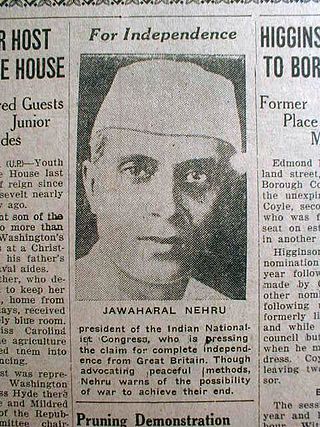
The Declaration of Purna Swaraj was a resolution which was passed in 1930 because of the dissatisfaction among the Indian masses regarding the British offer of Dominion status to India. The word Purna Swaraj was derived from Sanskrit पूर्ण (Pūrṇa) 'Complete', and स्वराज (Svarāja) 'Self-rule or Sovereignty', or Declaration of the Independence of India, it was promulgated by the Indian National Congress, resolving the Congress and Indian nationalists to fight for Purna Swaraj, or complete self-rule/total independence from the British rule.

In February 1948, the princely state of Junagadh, located in what is now the Indian state of Gujarat, was annexed to the Union of India after a dispute with the Dominion of Pakistan, regarding its accession, and a plebiscite.

The Nehru–Gandhi family is an Indian political family that has occupied a prominent place in the politics of India. The involvement of the family has traditionally revolved around the Indian National Congress, as various members have traditionally led the party. Three members of the family—Jawaharlal Nehru, Indira Gandhi and Rajiv Gandhi—have served as the prime minister of India, while several others have been members of parliament (MP).

Viceroy's House is a 2017 fictional drama film directed by Gurinder Chadha and written by Paul Mayeda Berges, Moira Buffini, and Chadha. The film stars Hugh Bonneville, Gillian Anderson, Manish Dayal, Huma Qureshi, and Michael Gambon. It was selected to be screened out of competition at the 67th Berlin International Film Festival.

The Gandhi Murder is a 2019 historical political thriller film directed by Karim Traïdia and Pankaj Sehgal. It examines the events leading to the assassination of Mahatma Gandhi. It stars Stephen Lang, Luke Pasqualino, Om Puri and Vinnie Jones.
Gangadharrao Balkrishna Deshpande also known as Lion of Karnataka, Khadi Bhageeratha of Karnataka, was an Indian activist who was the leader of the Indian independence movement against British colonial rule from Belgaum. He was the right-hand man of both Lokamanya Tilak and Mahatma Gandhi in succession. Deshpande considered Lokamanya Tilak as his Guru. Deshpande served as Chairman of Karnataka branch of All-India Spinners' Association, and the All India Village Industries Association for some years. Deshpande was largely responsible for the installation of Premier of Bombay, B. G. Kher.
